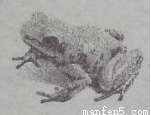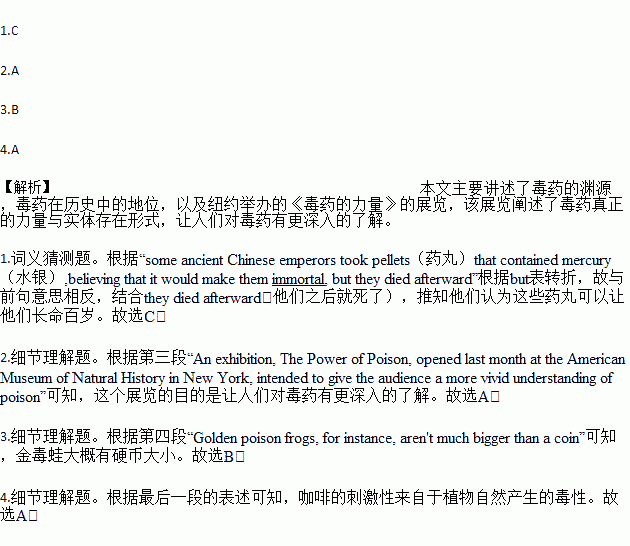题目内容
In the famous fairy tale, Snow White eats the Queen's apple and falls victim to a curse(诅咒);in Shakespeare's novel, Romeo drinks the poison and dies; some ancient Chinese emperors took pellets(药丸)that contained mercury(水银), believing that it would make them immortal, but they died afterward.

Poison has long been an important ingredient in literature and history, and it seems to always be associated with evil, danger and death. But how much do you really know about poison?
An exhibition, The Power of Poison, opened last month at the American Museum of Natural History in New York, intended to give the audience a more vivid understanding of poison.
The museum tour starts in a rainforest setting, where you can see live examples of some of the most poisonous animals: caterpillars(毛毛虫), frogs and spiders. Golden poison frogs, for instance, aren't much bigger than a coin, but their skin is covered with a poison that can cut off the signaling power of your nerves, and a single frog has enough venom to kill 10 grown humans.
"Poisons can be bad for some things," Michael Novacek, senior vice president of the museum, told NBC News. "Yet they can also be good for others."
A poisonous chemical found in the yew tree is effective against cancer, which is what led to the invention of a cancer-fighting drug called Taxol.
The benefits from natural poisons are not limited to just medicine. Believe it or not, many substances(物质)that we regularly ingest(摄入)-chili, coffee and chocolate-owe their special flavors or stimulating(提神的)effects to chemicals that plants make to poison insects.
1.What does the underlined word "immortal" in Paragraph 1 mean?
A. happy B. not moral
C. living forever D. sick
2.What is the main purpose of the exhibition The Power of Poison?
A. To give people more in-depth knowledge about poison.
B. To teach people how to handle poisonous animals.
C. To inform people about which animals are the most poisonous.
D. To show how poison has been used for medical treatment.
3.Which of the following statements about the Golden poison frog is TRUE according to the article?
A. Its skin can cut off the signaling power of your nerves.
B. It's about the size of a coin.
C. It's the most poisonous animal on display.
D. You can only see it in a rainforest setting of the museum.
4.The stimulating effects of coffee come from ________.
A. natural poison made by the plant
B. the substances that we regularly ingest
C. chemicals produced by poisonous insects
D. its special flavor


 sitting opposite stared.I met his glance with tears,actually hearing the music in my head for the first time.Could he hear it too, perhaps?No,he got off at the next stop. As the years slipped by,my daughter grew up,playing the piano well.My goal was that she and I would one day perform together.I also wanted to perform in public with and for my peers,and to be secretly envied.I continued to play,to perform,but it is not the same.Before,when I heard a cello,it was all beauty and light.Now,as the TV camera gets close to Rostropovich's face,I recognize that his smile shows his incredible determination.Even for him,the cello is a difficult instrument that doesn't respect your ambitions.I picked up my cello and practiced.As good as I wanted to be,I am as good as I'm going to get.It is good enough.
sitting opposite stared.I met his glance with tears,actually hearing the music in my head for the first time.Could he hear it too, perhaps?No,he got off at the next stop. As the years slipped by,my daughter grew up,playing the piano well.My goal was that she and I would one day perform together.I also wanted to perform in public with and for my peers,and to be secretly envied.I continued to play,to perform,but it is not the same.Before,when I heard a cello,it was all beauty and light.Now,as the TV camera gets close to Rostropovich's face,I recognize that his smile shows his incredible determination.Even for him,the cello is a difficult instrument that doesn't respect your ambitions.I picked up my cello and practiced.As good as I wanted to be,I am as good as I'm going to get.It is good enough.